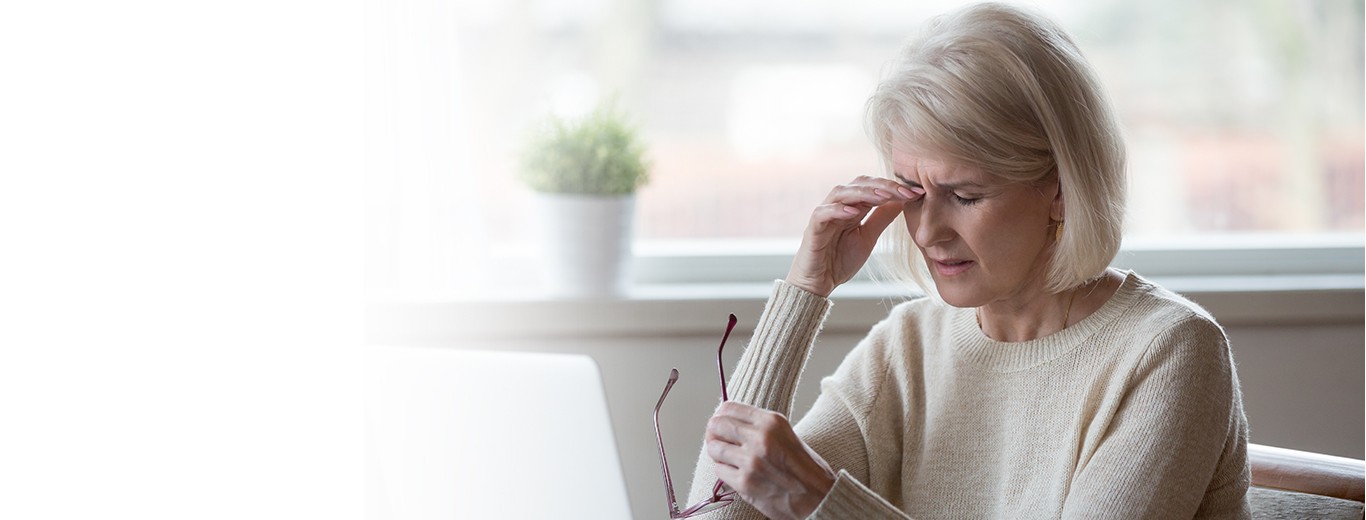Everything You Need
to Know About
Dry Eye Disease

Everything You Need
to Know About
Dry Eye Disease
It’s estimated that as of 2020, somewhere between 16 and 49 million Americans suffer from dry eye — in other words, 5-15% of the US population. [1] At the same time, we’ve found that some patients don’t know that they have dry eye and try to “learn to live with it” — suffering from the condition when they don’t need to.
We’ve put together this complete guide to dry eye so you can understand the condition, find out if you might have it, and learn how you can see comfortably again.
What Exactly is Dry Eye?
Dry eye is a condition where your tears don’t hydrate or lubricate your eyes enough. This causes your eyes to be chronically dry — even if your eyes are frequently watery with tears that aren’t doing their job.
How Tear Makeup Affects Tear Quality
Tears are made up of three key components: water, oil, and mucus. Each of these plays an important part in maintaining a healthy tear film:
- Water hydrates the eye and washes out debris and irritants
- Oil prevents tears from evaporating too quickly and spreads tears evenly across the eye
- Mucus spreads water over the eye and holds it on the eye
If any one of these layers fail, it can cause your tears to evaporate too quickly or make those tears so poor quality that they don’t actually hydrate your eyes. The latter is why it’s possible, and even common, for watery eyes to be a symptom of dry eye.
How Do I Know If I Have Dry Eye?
A number of dry eye symptoms can indicate the presence of this condition. If you have several of the following, you should come in for an eye exam:
- Eye discomfort such as burning, itching, stinging, inflammation, or the feeling of something being in your eyes
- Red, bloodshot eyes
- Watery eyes
- Blurry vision, especially if blinking somewhat helps
- Sensitivity to light
- Difficulty seeing at night
- Eye fatigue
Am I at Risk for Dry Eye?
When it comes to preventing dry eye, there are some risk factors you can’t control. For instance, being older, female, and of certain races can increase your likelihood of developing dry eye, as can having certain diseases or post-eye surgery complications. But some factors are within your control, including:
- Staring at screens for too long
- Exposing yourself to dry, smoky, or dusty environments
- Taking certain medications
- Wearing contact lenses
- Poor diet (lack of nutrients or water)

If you’re diagnosed with dry eye, your doctor might advise you to change some of these behaviors in order to ease the symptoms — for example, taking frequent breaks during computer use, wearing safety glasses, or changing up your diet.
Am I at Risk for Dry Eye?

When it comes to preventing dry eye, there are some risk factors you can’t control. For instance, being older, female, and of certain races can increase your likelihood of developing dry eye, as can having certain diseases or post-eye surgery complications. But some factors are within your control, including:
- Staring at screens for too long
- Exposing yourself to dry, smoky, or dusty environments
- Taking certain medications
- Wearing contact lenses
- Poor diet (lack of nutrients or water)
If you’re diagnosed with dry eye, your doctor might advise you to change some of these behaviors in order to ease the symptoms — for example, taking frequent breaks during computer use, wearing safety glasses, or changing up your diet.
Treating Dry Eye (The Right Way)
Many people who suffer from dry eye are recommended supplements that contain high amounts of omega-3 fatty acids, which have been shown to benefit eye health and dry eye, or eye drops and artificial tears that can alleviate dry eye symptoms. At Bristol Family Eyecare, we’re proud to offer all these solutions, as well as specialized in-office treatments and tools designed to address underlying gland conditions and other causes of dry eye.
The most important first step you can take towards getting treated for dry eye is meeting with one of our experienced eye doctors to determine if you have dry eye and, if so, what type and severity of dry eye you have. Call Bristol Family Eyecare for personalized care and relief from dry eye today!
